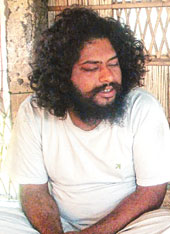
Arshinagar is a new settlement in Cooch Behar on the banks of the Torsha, founded by a one-time techie who renounced a life of comfort in Calcutta to preach the teachings of Lalon Fakir.
Nilabha Guha Chowdhury, 30, used to work in a multinational company in Calcutta where he had bought a flat. But somehow, he was drawn to Lalon Fakir, a 19th century mystic and preacher who preached to end casteism and religious intolerance.
It is said that Rabindranath Tagore was inspired by Lalon’s teachings and songs.
Nilabha started an ashram dedicated to the mystic on 25 bighas, 7km from Cooch Behar town. Arshinagar, as the settlement is called, means the “Mirror Town”.
What was once a featureless sand bank of the Torsha now is green with plants and blossoming with flowers.
Nilabha and his father planted these, especially flowers that blossom the whole year, such as hibiscus. But Nilabha’s quest is metaphysical.

Life is not a search for success alone, he says. Which is why he has chosen Lalon as his guide. At his ashram, called the Arshinagar Lalon Ashram, songs of the mystic are sung, his teachings are preached by followers.
Since 2013, Nilabha has held at the ashram a Lalon Utsav — this time from March 7-9 — that attracts mystics and singers of baul, a form of music, some believe, Lalon founded.
Nilabha, not a trained singer, but someone who joins the gathering of baul and fakir singers every evening at his ashram, talks about one of Lalon’s famous songs — Khanchar bhitor achin pakhi, kemne ashe jaye, which translates to “How the unknown bird flits in and out of the cage”.
“Even this body is not my own,” says Nilabha. That is why he wants to spread the word of Lalon among everyone; he wants to dedicate himself to the service of the poor, to educating their children, so that he can exhaust himself in the service, be a fakir, drained of everything, like Lalon himself.
Lalon, who was a critic of the caste system, had also asked in one of his famous songs: “The Brahmin is known by his holy thread/ How do I tell who is a Brahmin woman?”
Nilabha, who studied in Jenkins School in Cooch Behar and later at Jadavpur University in Calcutta, started Arshinagar on December 31, 2013.
“When I was studying physics and then computer science at JU, I would listen to a lot of baul songs in my friends’ circle. I started making frequent trips to meet Gholam Fakir in Murshidabad,” he recounts.
He completed his masters, did research for two years and joined as a systems analyst with a multinational company in 2007. He bought a flat in Calcutta.
“But I kept asking myself why was I doing all this? I chanced upon a book, Tapa Bhoomi Narmada. That changed my life. I left my job in 2010. The next year, I left on foot to follow the course of the Narmada. I stayed in holy places, meeting holy men.”
After he returned home he came in touch with Al Hami Fakir at the Achin Pakhi Lalon Ashram at Jalangi, Murshidabad.
“He is my guru. He inspired me to set up the ashram. Now, many Lalon bhakts come here. They sing and we discuss Lalon Fakir’s philosophy on how to lead life in the praise of our Maker,” Nilabha explains.
Nilabha’s father, Nirmal, a retired officer of the North Bengal State Transport Corporation, has come to terms with his son’s aspirations.
Nirmal comes over in the weekends to help his son.
“We have a variety of fruits, even watermelon. We are trying to stock up on food and grains at the ashram for those who will come and stay at Arshinagar. Last year, a baul festival was held here,” he says.
Chandrasekhar Pal, a 76-year-old amateur researcher of folk songs, has visited Arshinagar. “I was happy to see that this young man’s efforts will help preserve Lalon’s legacy. My grandfather, Basanta Kumar Pal, had written a book on Lalon Fakir more than 50 years ago. I will give a copy to Nilabha,” he said.
Nilabha said he is looking forward to opening a school here.











